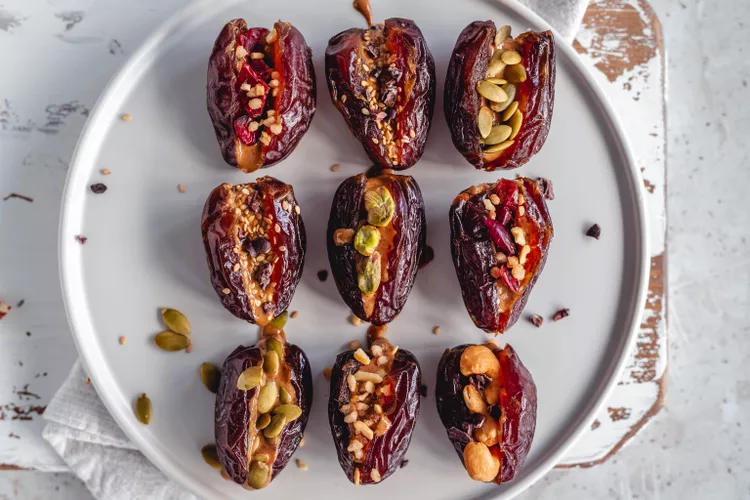Why Dates Are on Everyone’s Go-to Snack List Right Now

The delicious date, otherwise known as nature’s candy, is changing its reputation. Usually seen as solely a dessert add-in, it’s becoming easier and easier to find them in grocery aisles in snack form—if you pay attention to ingredient labels, you’ll find this fruit is used as a key ingredient in many sugar-free products hitting the market. Here’s what you need to know about the different varieties, their benefits, and how you can add them to your regular diet.
What are dates?
Dates are a type of fruit that grows in clusters on palm trees, and they’ve been an important ingredient in Middle Eastern cooking for thousands of years. Interestingly, while many assume these fruits are dried, the tacky texture they’re known for is actually their fresh state. Regions all over the globe have discovered the naturally sweet flavor of these chewy gems and the versatility that comes from all the different varieties.
Benefits of Eating Dates
In addition to their delicious taste, dates are also super nutrient-dense, resulting in some impressive benefits.
These fruits are full of fiber, which helps to promote and maintain healthy digestion, regularity, and gut bacteria. It also has the ability to reduce cholesterol and blood pressure levels, making it a perfect heart-healthy food choice. Plus, the fiber content means eating a handful of dates will make you feel full and satisfied while also regulating your blood sugar.
Dates contain high levels of many minerals including potassium, magnesium, manganese, selenium, and copper.
- Potassium is an important electrolyte to help us maintain healthy fluid balance, including blood pressure, throughout the body.
- Magnesium plays an important role in energy metabolism as well as muscle and nerve function.
- Manganese supports healthy bone, hormone, blood, and connective tissue development.
- Selenium is a key component of various types of protein and enzymes throughout the body while also helping to form DNA.
- Copper is an antioxidant that helps to form collagen, nerves, and blood cells.
Snacking on dates will provide you with the opportunity to add plenty of plant compounds to your diet, including carotenoids and flavonoids. These bioactive compounds are powerful antioxidants that help the body’s immune system function at its highest capacity by reducing inflammation.
Adding Dates to Your Diet
With more than 100 types of dates available, you might feel overwhelmed when deciding what to try. While all of the varieties offer similar nutritional content, each has a unique flavor profile. Here are just a few of the most popular dates you’ll find online and in the grocery store.
Medjool Dates
These dates are considered to be among the most flavorful with a rich, caramel-like taste. They’re larger in size and softer than many varieties, as they have a high-moisture content.
Deglet Noor Dates
The name of these dates literally translates to “the date of light,” mainly because of their gorgeous amber color. These dates are medium-sized and offer a nutty flavor, similar to cashews.
Halawi Dates
Also spelled Halawy or Halaway, this date type means “sweet” in Arabic. They have a beautiful golden color and a tasty honey-sweet flavor.
Ajwa Dates
These dates flaunt a mysterious dark color, similar to black licorice. They’re often used medicinally in the Middle East and have a rich, chocolate-caramel flavor.
No matter which kind of date you go for, a plethora of recipe ideas exist: You can ground them up to use as a nutritious, sugar-free sweetener for smoothies, oatmeal, baked goods, and ice cream. Dates stuffed with a mild cheese, nuts, or nut butter also make an easy, incredible snack. Dip them in chocolate for a decadent (but still nutritious) dessert.